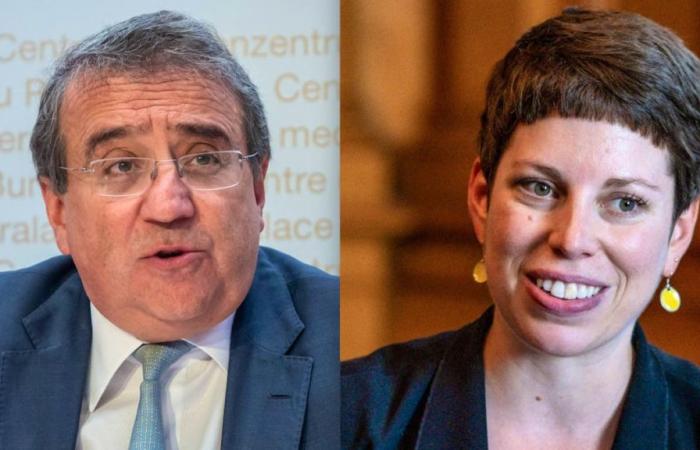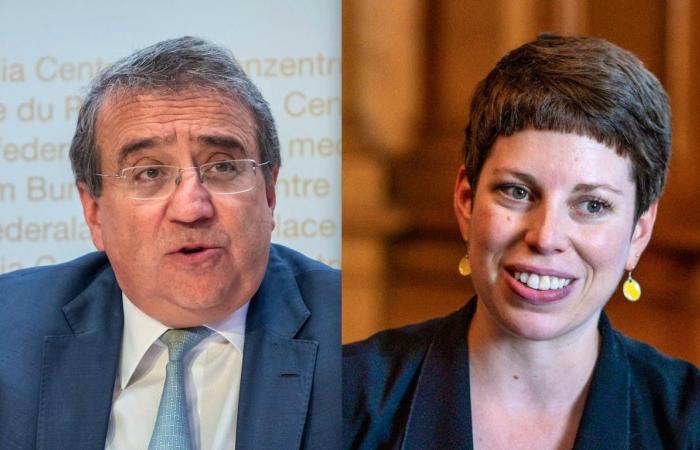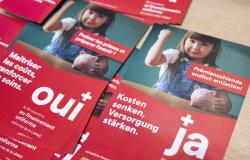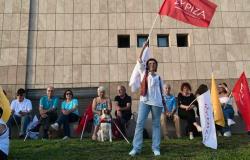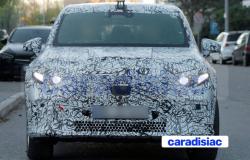Pascl Broulis supports the widening of highways, Lisa Mazzone absolutely does not want it.
On November 24, the Swiss will have to decide on a divisive subject: the widening of six motorway sections, including that between Le Vengeron (GE) and Nyon. A necessary evil to eliminate ever-increasing traffic jams, according to supporters. A call for air which will generate even more traffic, according to opponents. The president of the Greens Lisa Mazzone firmly refuses the project, the State Councilor Pascal Broulis (PLR/VD) is a fervent supporter. Cross-interviews.
Pascal Broulis, why do we need to widen the highways?
P.Broulis: In French-speaking Switzerland, Vaud and Geneva have recorded 500,000 more inhabitants in 20 years. There is therefore a need to upgrade our infrastructure, especially since our highways are vectors of wealth creation and territorial cohesion between populations. Furthermore, roads and rail should not be pitted against each other: they are complementary. We saw it with the Tolochenaz hole (VD). It disrupted rail traffic for several weeks and the road was able to alleviate the problem. Finally, the project is entirely supported by the FORTA fund. The road finances the road. It is therefore an intelligent, calibrated project, not enormous, which will bring real added value.
“Traffic has exploded by 440% in 60 years”
Lisa Mazzone, you refuse these enlargements. For what?
L. Mazzone: Widening the highways will make the situation worse, by increasing traffic, traffic jams and pollution. For the Le Vengeron-Nyon section, we are talking about going from 80,000 to 130,000 cars per day! However, if we expand the highways, the roads all around will still be the same. As a result, by creating additional capacities, they will be further overloaded and traffic will flow even more into neighborhoods and villages where residents already suffer from noise and insecurity due to traffic.
Pascal Broulis: Won’t there be a surge with ultimately even more traffic?
P.Broulis: No widening has been carried out since the creation of the Lausanne-Geneva motorway, that is to say for 60 years! During this period, traffic exploded by 440%. This idea of supply controlling demand is therefore erroneous or at least totally disconnected from the realities experienced by thousands of commuters on a daily basis. It is not by repeating the same things a thousand times that they end up becoming established facts.
“Traffic will flow even more into neighborhoods and villages”
Lisa Mazzone: Removing bottlenecks will help traffic flow, that’s not so bad, right?
L. Mazzone: First of all, local residents will have to endure 10 years of work and construction sites which will create additional traffic jams and send truck after truck! Then there will be perhaps 2-3 years of smoother traffic and it will be back on track. The Federal Roads Office itself speaks of a new saturation for the Geneva-Nyon section 10 years after entry into service. So this makes the problem worse.
P.Broulis. More highways means more pollution and concreting, right?
P:Broulis: The six projects represent only 2.3% of the total highway surface area. Concerning crop cultivation areas, the total work area only represents 11 football fields, while this agricultural land represents more than 620,000 fields. It is therefore totally exaggerated to claim that we are going to concrete over the landscape. Furthermore, the vehicle fleet is always cleaner and it is clear that smoother traffic reduces CO2 emissions.
Lisa Mazzone: Indeed, there will soon be only electric cars from 2035, so no more pollution…
L.Mazzone: There is an emergency for the climate, we see it with the extreme bad weather, in Valais for example. That’s how many years we are losing as the crisis accelerates. On the other hand, the production of electric cars, in countries affected by the extraction of rare metals, is socially, humanly and environmentally problematic. This is not a miracle solution.
Pascal Broulis: We hear fears linked to the exhaustion of the Forta fund which would lead to an increase in the price of gasoline. Founded?
It is an attempt to destabilize opponents. OFROU and the Federal Council disputed these remarks. The FORTA fund has a reserve of more than three billion and generates nearly 9 billion each year thanks to the road, via gasoline taxes, vignettes and automobile taxes. These revenues finance highways, rail but also the transfer from road to rail. Furthermore, automobile taxes are also largely used to finance public transport, station or railway projects! Without the car, it is therefore the taxpayer who would alone pay all the expenses for our mobility.
Lisa Mazzone: You consider the project excessive, why?
L.Mazzone: Bern plans to devote more than 5 billion francs to these extensions, while money is being cut in crèches, AVS, health insurance subsidies and climate protection. This is for an average of only one person per car during rush hour! Furthermore, the other projects are totally excessive. In Bern, there will be eight lanes. In Schaffhausen, a double-decker highway! Firsts in Switzerland. This is not defensible.

